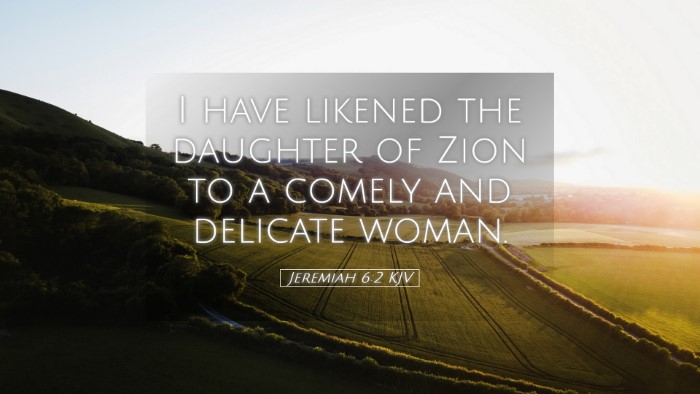Introduction
The verse from Jeremiah 6:2 presents a poignant metaphor that encapsulates the spiritual condition of Judah and the significance of Jerusalem, often referred to as the “daughter of Zion.” In this commentary, we will delve into insights gleaned from various public domain commentaries, particularly those by Matthew Henry, Albert Barnes, and Adam Clarke, providing a multifaceted understanding of this scripture.
Jeremiah's Context
The Book of Jeremiah is steeped in prophetic warnings and lamentations over Jerusalem's impending doom. Jeremiah, often called the "weeping prophet," is tasked with conveying God’s message to a wayward people. The metaphor of the 'comely and delicate woman' reflects not only the beauty and promise of Zion but also her vulnerability and impending destruction, emphasizing the gravity of her moral decline.
Insights from Public Domain Commentaries
Matthew Henry's Commentary
Matthew Henry describes the term "daughter of Zion" as a representation of Jerusalem, emphasizing its beauty and significance in the eyes of God. In his view, this metaphor serves to highlight both the city's past glory and present dire situation. Henry notes that the "comely" nature of Zion denotes a state of moral and spiritual splendor, reflective of God’s original design for His people.
Henry goes on to comment on the delicate nature of Zion, indicating that just as a delicate woman requires protection and care, so too does Jerusalem find herself in dire need of God’s mercy. This fragility is a lens through which we can view the urgency of repentance and the call to return to faithfulness. His application urges believers to reflect on their own spiritual state and integrity, warning against complacency that leads to ruin.
Albert Barnes' Notes on the Bible
Albert Barnes elaborates on the metaphor by pointing out that Zion, as a figure of the church and the people of God, represents the fellowship and community intended to be cultivated in holiness. He notes that likening Zion to a “delicate woman” reveals the intimate relationship between God and His people—highlighting the need for fidelity and loyalty.
Barnes emphasizes that the beauty of Zion is both an asset and a vulnerability. The church's delicate nature means that it is susceptible to outside influences and internal corruption, necessitating vigilance in maintaining its purity. He calls attention to the consequences of abandonment from God, suggesting that when the people forsake their covenant with God, they diminish their own strength and beauty.
Adam Clarke's Commentary
Adam Clarke takes a slightly different approach, focusing on the implications of the term "comely" in relation to social and spiritual leadership. He expounds that a society that is spiritually healthy and delicate can assume positions of influence and guidance. For Clarke, the reference to the delicate woman symbolizes a community that must not only uphold moral standards but actively promote a culture of holiness.
Clarke warns that Jerusalem's belligerence and idolatry, much like a woman unduly influenced by external pressures, threaten her very existence. He offers that the encroaching Babylonian threat serves as a spiritual parallel, calling for the church today to reflect on its own vulnerability amidst cultural pressures, illustrations of complacency, and abandonment of godly virtues.
Practical Applications
For pastors, theologians, and students, Jeremiah 6:2 serves as a multifaceted call to action:
- Reflection on Leadership: Church leaders should evaluate their roles in fostering a nurturing environment for spiritual growth. Preparing the congregation to reflect God’s beauty and glory requires intentional discipleship and accountability.
- Community Vigilance: The delicate condition of the church emphasizes the necessity for communal vigilance. Believers are urged to support one another, holding each other accountable to God’s standards, ensuring that together they represent the beauty of Christ.
- Call to Repentance: Just as Jeremiah called his people to repentance, modern believers are invited to consider areas of their lives that need realignment with God’s will. Recognizing our vulnerability can lead to heartfelt repentance and renewal.
Conclusion
Jeremiah 6:2 stands as a profound statement of the relationship between God and His people, symbolized through the delicate and comely nature of Zion. Drawing from the insights of respected commentators such as Matthew Henry, Albert Barnes, and Adam Clarke reveals layers of meaning that resonate deeply with today’s church. The beauty, vulnerability, and strength of this metaphor invite reflection, calling believers towards revitalization and faithfulness.
As we ponder the implications of this verse, may we strive to embody the comeliness of Zion, reflecting God’s glory in a world that desperately needs it.


